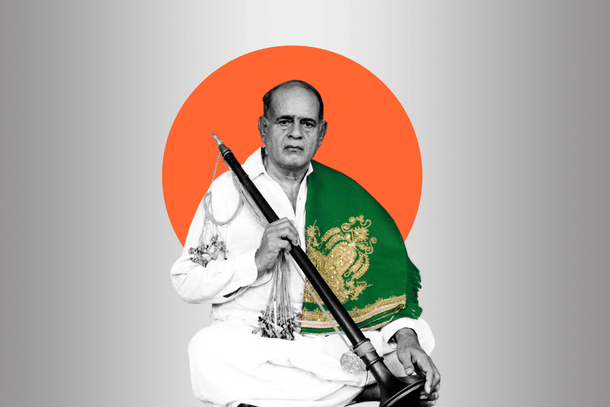Culture
Celebrating The Legend of Vidhwan Dr Sheik Chinna Moulana, The Nadhaswaram Maestro
Adithi Gurkar
Sep 11, 2021, 11:33 AM | Updated 11:33 AM IST
Save & read from anywhere!
Bookmark stories for easy access on any device or the Swarajya app.


From Kabir to Kazi Nazrul Islam, history has numerous instances of saints and poets transcending the borders of religion through the devotion of music. The legacy of Dr. Sheik Chinna Moulana of Srirangam is no different. The Vidhwan, a doyen in the ancient art of playing the nadhaswaram, was an inheritor of a tradition preserved and fostered by his ancestors for nearly 300 years.
Muslim musicians performing compositions in praise of the Hindu divine is a testament to the syncretism of India. However, how can one born into a religion succeed in attaining mastery over compositions associated with the worship of another? A look into Sheik Sahib's life and philosophy provides some answers.
Early Life
He was born on 12 May 1924, to parents Sheik Kasim Sahib and Beebi Jan. The family possessed generations of great exponents of the nadhaswaram who would often perform at various Hindu temples in Andhra Pradesh. As a child, Dr. Sheik Chinna Moulana learned under the tutelage of his grandfather Sheik Abdulla Sahib, his uncle Sheik Madar Sahib and his father, Sheik Kasim Sahib.
He was consumed by T. N. Rajarathnam Pillai’s nadhaswaram music which he heard on gramophone records. He then attended formal lessons under Sheik Adam Sahib of Chilakaluripeta school of music. However, so great was his admiration of Rajarathnam Pillai that he and his father decided to travel to Tamil Nadu to pursue the Thanjavur Bani (school). After initially training for a few months every year under Vidhwan brothers Ranjan and Duraikannu Pillai, Sheikh Sahib gave his first performance in Tamil Nadu at Salem in 1904. As his popularity gradually grew, he was accorded the name Chinna by the people of Tamil Nadu.
Srirangam and His Philosophy
He moved to Srirangam in 1964 to be closer to violinist Ramanathapuram Ganesa Pillai who had helped finance his concerts substantially. Though (courtesy his religion) he did face initial resistance by some local musicians, many others witnessed his skill and devotion.
Sheikh Shaib founded the Sarada Nagaswara Sangeeta Ashram in Srirangam, where he would spend his evenings teaching and his mornings learning and memorizing new songs.
To him music was the true religion. Though a practicing Muslim, he always felt that he was protected by the grace of Lord Ranganathaswamy and would often state that Rama was his istha deva. Armed with this belief, he soon became a renowned nadhaswaram musician. He carved a niche for himself within a primarily Hindu cultural sphere by becoming the Asthana Vidhwan of both Tirupati and Srirangam Devasthanams. Through all this he maintained one thavil partner for nearly 30 years—that was Valangaiman A Shanmugasundaram Pillai.
Moulana was a perfectionist. He sought mastery over the Sahitya of every Kriti and is even credited for inventing a new fingering technique for playing the nadhaswaram. The method which was developed by accident is the same technique that is being followed by his grandson- Kasim.
Dr Sheik Chinna Moulana was appointed as a state artist by the Tamil Nadu government. He was an Hon. Professor at the Raja’s Government Music College of Thiruvaiyaru. He travelled all across Europe (particularly France and Germany) where he gave numerous performances. He is said to have performed in Sri Lanka, the Soviet Union and in the UAE as well. In New York’s Vasser college he was awarded the title "Nadhaswara Acharya".
He was awarded India’s fourth highest civilian award in 1977. On 1 January 1999, at his last concert he was honoured with the Madras Music Academy’s Sangeetha Kalanidhi. Aged 75, after a period of brief illness he left for the heavenly abode on 13 April 1999.
His Legacy
Today, his legacy lives on through his disciples including his two grandsons Kasim and Shuban Babu. They are the torchbearers of the Moulana family tradition. They, like their illustrious grandfather, are special nadhaswaram artists of the Tirumala Tirupati Devasthanams. Proud of being from a 300-year old family of Rama Bhakthas, they are the blessed inheritors of their Thatha’s philosophy which regards music as religion and perfection as the aim.
Apart from the brothers, an equally well renowned nadhaswaram duo are Sheik Mahaboob Subhani and his wife Kaleeshabi Mahaboob. They were awarded the Padma Shri by the Central government last year. Kaleeshabi Mahaboob also hails from a family of generational nadhaswaram players in Andhra Pradesh; she however had to prevail over initial objections from the orthodoxy over a woman playing the nadhaswaram. However, after marriage she and her husband travelled to Sriramgam to train under the tutelage of Sheik Chinna Moulana for a decade.
Interestingly, it was during their concert at Thiruvaiyaru, the land of Thyagaraja where Sheikh Shaib lent them his nadhaswaram that they began to gain recognition.
They too are aware of the unique circumstances they find themselves in- being Muslim exponents of Hindu sacred compositions. However, it is again Sheik Shiab’s philosophy that thrives. Though Muslims by birth performing the mangala isai (sacred music) has been part of their family tradition for years.
The adage “Sisurvethi Pasurvethi Vethi Ganarasam Panihi” (even children, cows and cobras are enchanted upon hearing the nadhaswaram music rendered by virtuosos and maestros) certainly holds true for Vidhwan Sheik Chinna Moulana and his disciplines who continue to propagate his splendid legacy to date.





